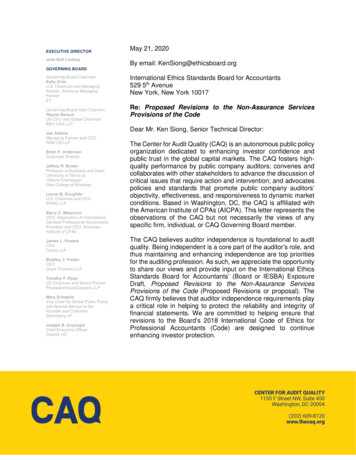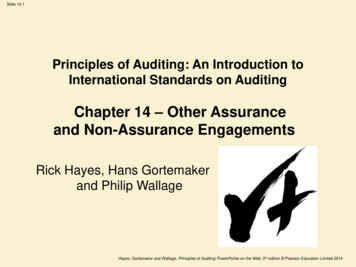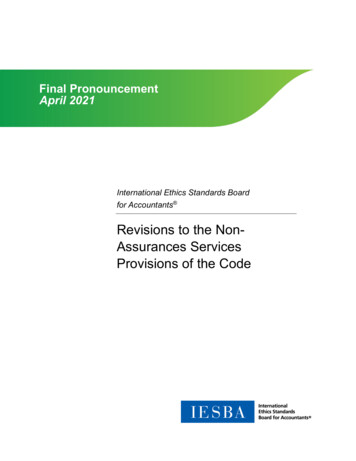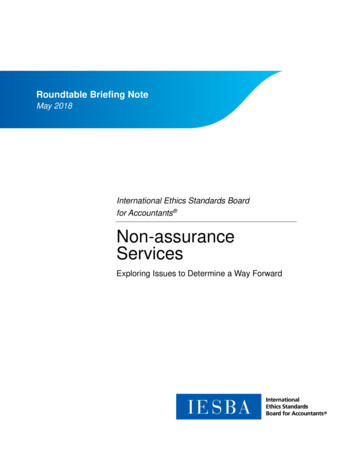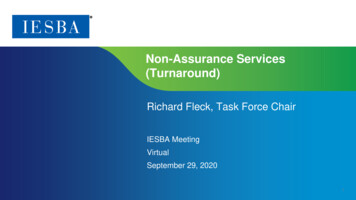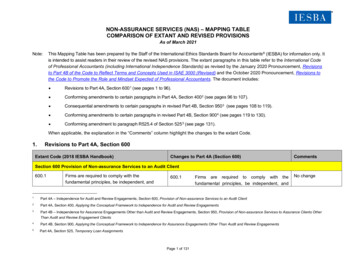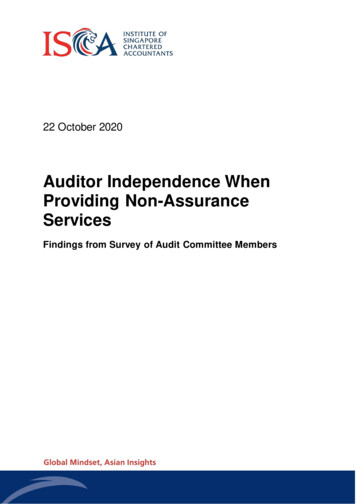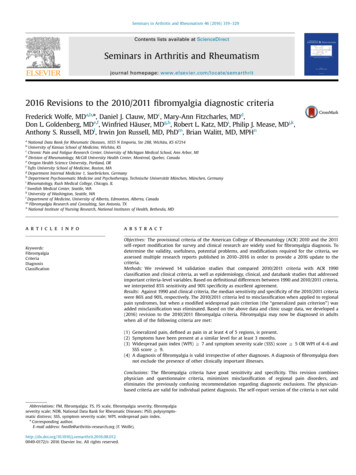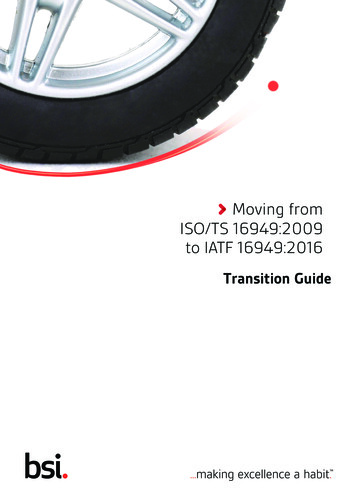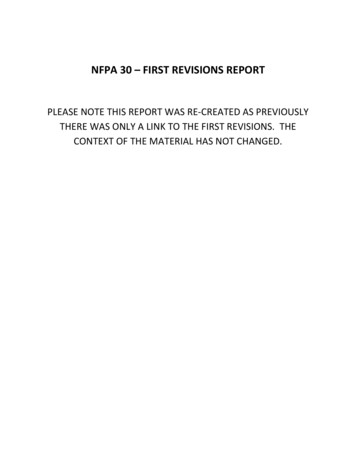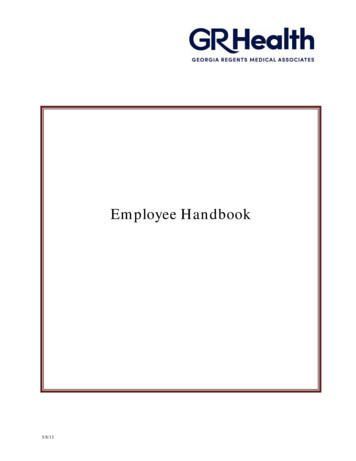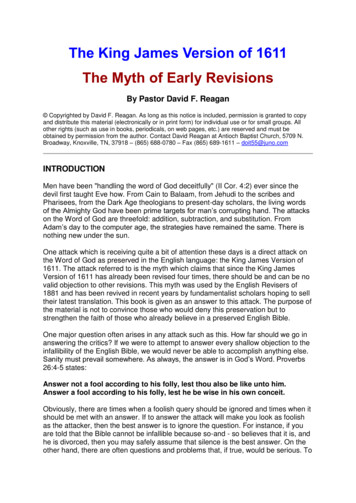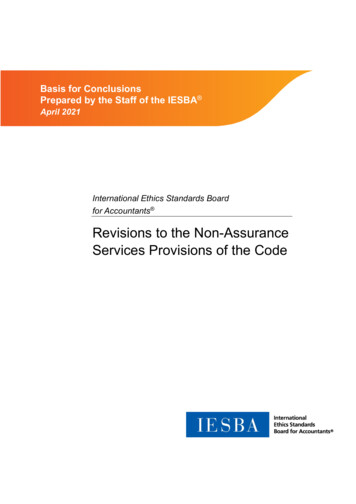
Transcription
IFAC BoardBasis for ConclusionsExposurePrepared Draftby the Staff of the IESBA April 2021October 2011International Ethics Standards Boardfor Accountants Revisions to the Non-AssuranceServices Provisions of the Code
About the IESBAThe International Ethics Standards Board for Accountants (IESBA ) is an independent globalstandard-setting board. The IESBA’s mission is to serve the public interest by setting ethicsstandards, including auditor independence requirements, which seek to raise the bar for ethicalconduct and practice for all professional accountants through a robust, globally operable InternationalCode of Ethics for Professional Accountants (including International Independence Standards) (theCode).The IESBA believes a single set of high-quality ethics standards enhances the quality and consistencyof services provided by professional accountants, thus contributing to public trust and confidence inthe accountancy profession. The IESBA sets its standards in the public interest with advice from theIESBA Consultative Advisory Group (CAG) and under the oversight of the Public Interest OversightBoard (PIOB).The structures and processes that support the operations of the IESBA are facilitated by theInternational Federation of Accountants (IFAC ).Copyright April 2021 by the International Federation of Accountants (IFAC). For copyright, trademark,and permissions information, please see page 37.
BASIS FOR CONCLUSIONS:REVISIONS TO THE NON-ASSURANCE SERVICES (NAS)PROVISIONS OF THE CODECONTENTSPageI.Introduction. 4A.II.III.IV.V.Highlights of Revised NAS Provisions . 4Background. 5A.Development of the Project Proposal . 5B.Objective of the Project . 6C.Interaction with Other IESBA Work Streams and Coordination with IAASB . 6D.NAS Exposure Draft . 8Key Issues Relating to the Revision of Section 600, Including Subsections . 10A.Self-review Threat Prohibition, Providing Advice and Recommendations and Materiality. 10B.Firm Communications with TCWG, Including Audit Committees . 18C.Appropriateness of NAS Safeguards . 22D.Documentation . 24E.Revisions to the Specific Provisions in Subsections 601 to 610 . 24Conforming and Consequential Amendments . 33A.Matters Relevant to Section 400 . 33B.Matters Relevant to Section 950 . 34Effective Date and Transitional Provision . 353
BASIS FOR CONCLUSIONS: REVISIONS TO THE NAS PROVISIONS OF THE CODEI.Introduction1.At its December 2020 virtual meeting, the IESBA unanimously approved the revisions to the nonassurance services (NAS) provisions of the Code with the affirmative votes of 15 out of 15 IESBAmembers present.2.This Basis for Conclusions is prepared by IESBA staff and explains how the IESBA hasaddressed the significant matters raised on exposure and in the course of finalizing the revisions.It relates to, but does not form part of, the revisions to the NAS provisions that are set out in thefinal pronouncement.3.The revised NAS provisions will replace Section 600 1 for audit and review engagements, andSection 950 2 for assurance engagements other than audit and review engagements. 3Consequential and conforming amendments have been made to Sections 400, 4 525, 5 and 900. 6A staff-prepared supplemental document, Mapping Table: Non-Assurance Services –Comparison of Extant and Revised Provisions accompanies the final pronouncement and isintended to assist firms, professional accountancy organizations (PAOs), national standardsetters (NSS) and other stakeholders understand the nature of the revisions to the extant Code.A.Highlights of Revised NAS Provisions4.The revised NAS provisions contain substantive revisions that will enhance the InternationalIndependence Standards (IIS) by clarifying and addressing the circumstances in which firms andnetwork firms may or may not provide a NAS to an audit or assurance client. The revisedprovisions include new requirements that expressly prohibit firms and network firms fromproviding certain types of NAS to their audit clients, especially when they are public interestentities (PIEs). 7 Key changes to the extant IIS arising from the NAS project include:A new general prohibition on the provision of a NAS to an audit client that is a PIE if theprovision of that service might create a self-review threat to the firm’s independence (see 1Part 4A – Independence for Audit and Review Engagements, Section 600, Provision of Non-assurance Services to an AuditClient2Revised Part 4B – Independence for Assurance Engagements Other than Audit and Review Engagements, Section 950,Provision of Non-assurance Services to Assurance Clients Other Than Audit and Review Engagement Clients3In January 2020, the IESBA released revisions to Part 4B, Alignment of Part 4B of the Code to ISAE 3000 (Revised), toalign the independence provisions in Part 4B of the Code with the revised assurance terms and concepts in the InternationalAuditing and Assurance Standards Board’s (IAASB’s) International Standard on Assurance Engagements (ISAE) 3000(Revised), Assurance Engagements Other than Audits or Reviews of Historical Financial Information.4Part 4A, Section 400, Applying the Conceptual Framework to Independence for Audit and Review Engagements5Part 4A, Section 525, Temporary Personnel Assignments.6Revised Part 4B, Section 900, Applying the Conceptual Framework to Independence for Assurance Engagements OtherThan Audit and Review Engagements7The extant Code defines a PIE as:(a)A listed entity; or(b)An entity:(i)Defined by regulation or legislation as a PIE; or(ii)For which the audit is required by regulation or legislation to be conducted in compliance with the sameindependence requirements that apply to the audit of listed entities. Such regulation might be promulgated by anyrelevant regulator, including an audit regulator.As further discussed below, in January 2021, the IESBA released an Exposure Draft with proposals that include a reviseddefinition of PIE. See section V for a discussion on the effective dates for the revised NAS provisions and the proposed PIEdefinition.4
BASIS FOR CONCLUSIONS: REVISIONS TO THE NAS PROVISIONS OF THE CODEparagraph R600.16). New provisions to assist firms and network firms in identifying and evaluating self-reviewthreats that might be created by the provision of a NAS to an audit client (see paragraphs600.13 A1 to R600.14). New guidance indicating that the provision of advice and recommendations might create aself-review threat and which also explains the circumstances in which a firm or a networkfirm may provide advice and recommendations to an audit client (see paragraphs 600.11A1 and R600.17 to 600.17 A1). New provisions to strengthen and improve the quality of firm communication with thosecharged with governance (TCWG) about NAS-related matters, especially in the case ofaudit clients that are PIEs and entities within that PIE’s corporate structure (see paragraphs600.20 A1 to R600.24). Enhanced guidance to explain that the concept of materiality is not relevant in evaluatingwhether a self-review threat might be created by the provision of a NAS to an audit clientthat is a PIE (see paragraphs 47(c) and 59 of this document). Strengthened provisions to assist firms in addressing threats to independence that arecreated by the provision of NAS to audit clients that are not PIEs, including new applicationmaterial in relation to situations where a safeguard is not available (see 600.18 A1 to600.18 A4). New provisions and structural refinements to promote the consistent application of the NASprovisions. For example:oThe revised NAS provisions identify certain situations where a self-review threat toindependence is not created (see paragraphs R601.7, 604.12 A2 and 604.17 A3).oThe provisions that prohibit firms and network firms from assuming a managementresponsibility are given more prominence by being repositioned to Section 400.oThe provisions related to acting as a witness are revised and include applicationmaterial to explain the circumstances in which the advocacy threat created by actingas an expert witness will be at an acceptable level (see paragraphs 607.7 A1 toR607.9).II.BackgroundA.Development of the Project Proposal5.The project to revise the NAS provisions of the Code was a high priority commitment in theIESBA’s Strategy and Work Plan, 2019-2023. It responded to a number of legal and regulatorydevelopments aimed at addressing issues affecting auditor independence, including audit firms’provision of NAS to audit clients. Some regulatory stakeholders and the Public Interest OversightBoard (PIOB) had also called on the IESBA to review the IIS relating to the provision of NAS toaudit clients.6.The project, which was approved in September 2018, was informed by the feedback received ona Briefing Paper, Non-Assurance Services – Exploring Issues to Determine a Way Forward, thatwas discussed at four global roundtables, 8 as well as advice from the IESBA Consultative8About 150 senior-level delegates representing a wide range of stakeholder groups (including investors, regulators, public5
BASIS FOR CONCLUSIONS: REVISIONS TO THE NAS PROVISIONS OF THE CODEAdvisory Group (CAG). The IESBA also took into account the suggestions that it received fromrespondents to its December 2015 Exposure Draft (ED), Proposed Revisions Pertaining toSafeguards in the Code—Phase 1, January 2017 ED, Proposed Revisions Pertaining toSafeguards in the Code—Phase 2 and Related Conforming Amendments, and November 2017Fees Questionnaire.B.Objective of the Project7.The objective of the project was to strengthen the IIS by addressing public interest concernsabout the perceived lack of independence when firms provide NAS to their audit clients. Indeveloping the revised NAS provisions, the IESBA actively monitored and considered relevantjurisdiction-level developments and initiatives impacting auditor independence requirements,especially in relation to NAS that firms may provide to their audit clients.8.The final NAS provisions are significantly more robust and contain new restrictions that the IESBAdeems appropriate for global adoption in today’s business environment and to meet publicinterest expectations.C.Interaction with Other IESBA Work Streams and Coordination with IAASBFees Project9.The NAS project and the Fees project were finalized concurrently. The final pronouncement,Revisions to the Fee-related Provisions in the Code, strengthens the independence requirementsfor firms with respect to fees paid by an audit client. In particular, in the case of audit clients thatare PIEs, the revised provisions provide for the disclosure of fee-related information to TCWGand to the public, including in relation to NAS.10.The IESBA’s revised NAS and fee-related provisions collectively seek to: Focus attention on potential threats to independence created by fees, and Improve transparency about fee-related matters for audit clients that are PIEs, includingthe fees for services other than audit (including NAS fees).(See paragraphs 600.9 A2, last bullet and 600.21 A1, second bullet.)11.In developing the NAS revisions, the IESBA considered including a fee cap in relation to NAS tomitigate threats to independence. Although fee caps are already established in certainjurisdictions (e.g., the European Union), the IESBA determined that restrictions such as fee capswould not be operable at the global level. The IESBA noted feedback from NAS roundtableparticipants who, with the exception of some European-based regulatory participants, expressedlittle or no support for establishing fee caps in the Code. 9sector representatives, preparers, TCWG, NSS, regional and international organizations, and representatives of theaccountancy profession (both those in public practice and in business) participated in or observed the IESBA’s roundtables.The roundtables were held in Washington, DC, U.S.A.; Paris, France; Tokyo, Japan; and Melbourne, Australia in June/July2018.9With respect to fee caps, roundtable participants, including some investor stakeholders, expressed the following views: With enhanced transparency about NAS and NAS fees, market forces would address the NAS issues. The IESBA would be going beyond its remit in establishing fee restrictions, in particular, fee caps in the Code. Theynoted that fee caps are often dealt with in sovereign and anti-trust laws at the jurisdiction level. Establishing fee restrictions involves complex definitional issues.6
BASIS FOR CONCLUSIONS: REVISIONS TO THE NAS PROVISIONS OF THE CODE12.Further, as the IESBA expects that the more robust NAS and fee-related provisions are likely toaddress the concerns raised by stakeholders, there would be little or no benefit in introducing fee
1. At its December 2020 virtual meeting, the IESBA unanimously approved the revisions to the non-assurance services (NAS) provisions of the Code with the affirmative votes of 15 out of 15 IESBA members present. 2. This Basis for Conclusions is prepared by
